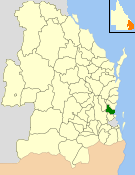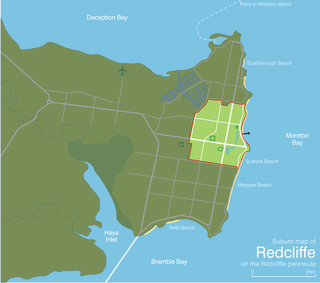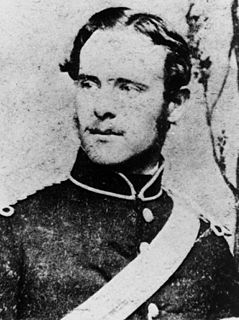
Caloundra is the southernmost town in the Sunshine Coast Region in South East Queensland, Australia.
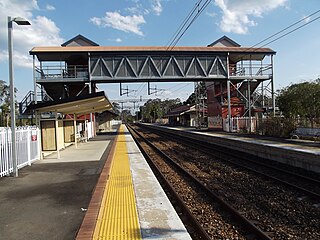
Landsborough railway station is located on the North Coast line in Queensland, Australia. It serves the town of Landsborough in the Sunshine Coast Region.
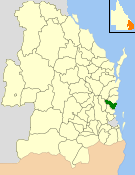
The City of Caloundra was a local government area about 90 kilometres (56 mi) north of Brisbane in the Sunshine Coast region of South East Queensland, Australia. The shire covered an area of 1,093.1 square kilometres (422.0 sq mi), and existed as a local government entity from 1912 until 2008, when it amalgamated with councils further north to form the Sunshine Coast Region.

Cardwell Bush Telegraph is a heritage-listed former post office and now heritage centre at 53 Victoria Street, Cardwell, Cassowary Coast Region, Queensland, Australia. The Telegraph and Post Office at Cardwell was designed by Colonial Architect's Office and built in 1870 by George McCallum, making it one of the oldest buildings in North Queensland.

The Ithaca Town Council Chambers is a heritage-listed former town hall of the former local government area of the Town of Ithaca, and now a community centre in Paddington, City of Brisbane, Queensland, Australia. Located at 99 Enoggera Terrace, Red Hill, it was designed by Atkinson and McLay and built in 1910 by Charles Thomas Hall and Francis Joseph Mayer. It is also known as Ithaca Library and Red Hill Kindergarten. It was added to the Queensland Heritage Register on 24 March 2000.

Pittsworth Shire Council Chambers and Shire Hall is a heritage-listed former town hall at Short Street, Pittsworth, Toowoomba Region, Queensland, Australia. It was built from 1913 to 1914 by John Fortune. It is also known as Pittsworth Kindergarten. It was added to the Queensland Heritage Register on 28 May 1999.

Cook Shire Hall is a heritage-listed community hall at Helen Street, Cooktown, Shire of Cook, Queensland, Australia. It was built from 1907. It is also known as Cooktown Presbyterian Church, Oddfellows Hall, and Standen's Hall. It was added to the Queensland Heritage Register on 8 April 1997.

Pine Rivers Shire Hall is a heritage-listed town hall at 238 Gympie Road, Strathpine, Moreton Bay Region, Queensland, Australia. It was built from 1889 to 1935. It is also known as Pine Divisional Board Hall, Pine Rivers Shire Hall, and Pine Shire Hall. It was added to the Queensland Heritage Register on 21 October 1992.
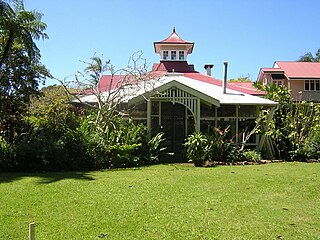
Buderim House is a heritage-listed homestead at 10 Orme Road, Buderim, Sunshine Coast Region, Queensland, Australia. It was designed by George Trotter and built c. 1915 by Christian Schriver. It was added to the Queensland Heritage Register on 2 March 1993.
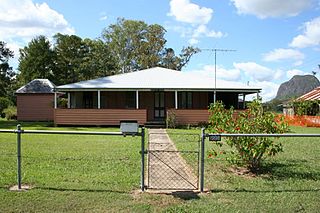
Bankfoot House is a heritage-listed homestead at 1998 Old Gympie Road, Glass House Mountains, Sunshine Coast Region, Queensland, Australia. It was built in 1878. It was added to the Queensland Heritage Register on 11 December 2008.
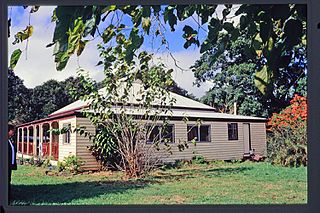
Fairview is a heritage-listed house at 15 Porter's Lane, Maleny, Sunshine Coast Region, Queensland, Australia. It was designed and built in 1907 by the Pattemore family. It is also known as Armstrong's House and Pattemore House. It was added to the Queensland Heritage Register on 4 September 2003.

Burdekin Shire Council Chambers is a heritage-listed town hall at 145 Young Street, Ayr, Shire of Burdekin, Queensland, Australia. It was designed by Frederick Smith and built in 1937 by local builder AS Wight. It is also known as Ayr Shire Council Chambers. It was added to the Queensland Heritage Register on 13 October 1997.

Cairns City Council Chambers is a heritage-listed former town hall and now council library at 151 Abbott Street, Cairns, Cairns Region, Queensland, Australia. It was designed by Hill & Taylor and built from 1929 to 1930 by Alex McKenzie. It was added to the Queensland Heritage Register on 5 October 1998. It is now home to the Cairns City Library.

Mulgrave Shire Council Chambers is a heritage-listed former town hall at 51 The Esplanade, Cairns, Cairns Region, Queensland, Australia. It was designed by Charles Dalton Lynch & Walter Hunt and built from 1912 to 1913 by Wilson & Baillie. It is also known as Cairns Shire Offices. It was added to the Queensland Heritage Register on 6 January 1999.

Cook Shire Council Chambers is a heritage-listed former town hall and now museum at 121 Charlotte Street, Cooktown, Shire of Cook, Queensland, Australia. It was built from 1876 to 1877 by Henry J Meldrum and John Sullivan. It was also known as Cooktown Post and Telegraph Office and is now known as Cooktown History Centre. It was added to the Queensland Heritage Register on 8 April 1997.

The Landsborough Shire Historical Museum is a local history and social history museum located in the Sunshine Coast town of Landsborough in Queensland, Australia. The museum explicitly houses and records the local history of the former Landsborough shire and includes the centre of Caloundra and is housed in the Heritage listed Landsborough Shire Council Chambers on Maleny Street.

Tambo Post Office is a heritage-listed former post office and now museum at Arthur Street, Tambo, Blackall-Tambo Region, Queensland, Australia. It was built in 1876 and 1885. It is also known as Post and Telegraph Office Tambo and Tambo Telecommunications Museum. It was added to the Queensland Heritage Register on 21 October 1992.









